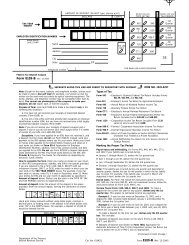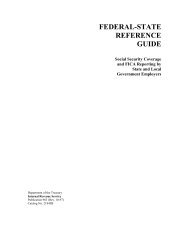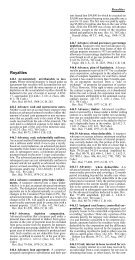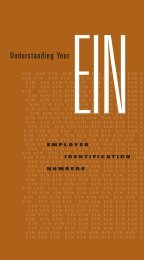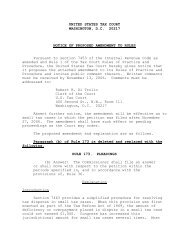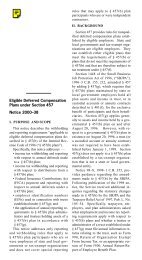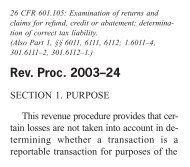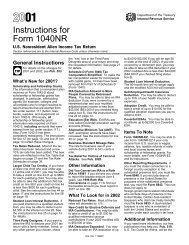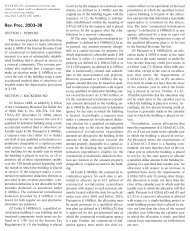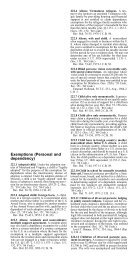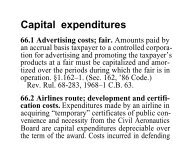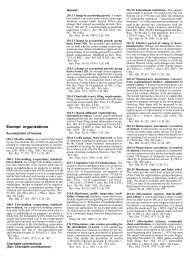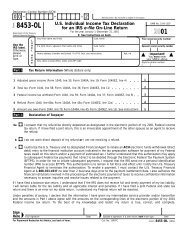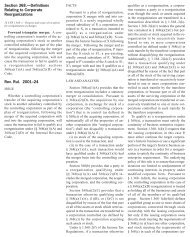Auto Dealerships - Audit Technique Guide - Uncle Fed's Tax*Board
Auto Dealerships - Audit Technique Guide - Uncle Fed's Tax*Board
Auto Dealerships - Audit Technique Guide - Uncle Fed's Tax*Board
Create successful ePaper yourself
Turn your PDF publications into a flip-book with our unique Google optimized e-Paper software.
Contract Construction<br />
Generally, a dealership should be fully aware when they are a principal. Most contracts<br />
explicitly state the dealer is a principal or an obligor. Try to ascertain whether the dealer<br />
entered into this contract free of mistake or duress of the insurance company. Absent such a<br />
finding, the dealership should not be allowed to use parol evidence to interpret the contract,<br />
having it conform to the dealership’s immediate needs.<br />
Some dealers may claim they are not principals, even though the contract explicitly states<br />
they are.<br />
The courts have followed the IRS’s interpretation of these contracts determining the dealer a<br />
principal, where the facts warrant. They have held that the surrounding circumstances and<br />
parol evidence of a transaction may be considered by the IRS if the contractual terms of an<br />
agreement are unclear or ambiguous. The court determined in, Rochester Development<br />
Corporation v. Commissioner, T.C. Memo. 1977-307, CCH 34,630(M), that the surrounding<br />
circumstances and parol evidence of a transaction may be considered by the IRS if the<br />
contractual terms of an agreement are unclear or ambiguous. See Commissioner v.<br />
Danielson, 378 F.2d 771 (3rd Cir. 1967) cert. denied, 389 U.S. 858 (1967), Joan S. Schatten<br />
v. United States, 746 F.2d 319 (6th Cir. 1984), and Johnie Vaden Elrod v. Commissioner, 87<br />
T.C. 1046 (1986).<br />
However, parol evidence will not be allowed where there is no such ambiguity and the terms<br />
are clear. Where the contract is not vague and ambiguous the courts have indicated they will<br />
narrowly construe the terms of the contract and uphold its clear meaning. For a taxpayer to<br />
challenge the Commissioner’s construction of an agreements clear and unambiguous form,<br />
some federal circuit courts have held the taxpayer must show proof that the agreement was<br />
unenforceable because of mistake, undue influence, fraud, or duress. See Rochester<br />
Development Corporation v. Commissioner, T.C. Memo. 1977-307, CCH 34,630(M).<br />
Change in Accounting Method Concerns and IRC section 481(a)<br />
Treas. Reg. section 1.446-1(a) defines method of accounting as not only the overall method<br />
of accounting of the taxpayer, but also the accounting treatment of any item. A method of<br />
accounting is established by the proper treatment of an item in the first year that the taxpayer<br />
has the item or by improper treatment of the item in the first 2 years that the taxpayer has the<br />
item. A material item is one involving the timing of its inclusion or deduction. A change in<br />
method does not include correction of mathematical or posting errors or tax computation<br />
errors or of an item not involving a question of timing.<br />
Treas. Reg. section 1.446-1(e)(2)(ii), states a material item is any item which involves the<br />
proper time for the inclusion of the item in income or the taking of a deduction.<br />
A method of accounting involves the consistent treatment of a material item. A material item<br />
is any item that involves the proper time for the inclusion of an item in income or the taking<br />
11-6



